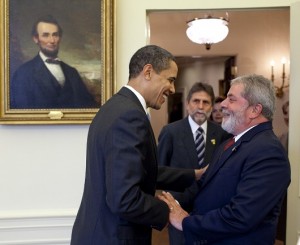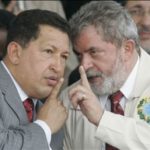
President Obama and Brazil's Luiz Ignacio 'Lula' DaSilva Meet in the Oval Office.
President Barack Obama and Brazilian President Luiz Inacio Lula Da Silva discussed the economy, energy and the environment Saturday during their first meeting in the Oval Office. It is significant that Da Silva is the first Latin American leader to meet with President Obama in terms of relative importance among Latin American allies as the Administration puts its stamp on U.S. Foreign Policy. Trade and economics are one of the driving issues in contemporary U.S.-Latin American relations. Brazil is the largest export market for American products in Latin America, accounting for $26 billion (2008) or 15% of total U.S. exports. In addition, China in the last decade has made strong in-roads in trade relations throughout Latin American, but with Brazil in particular, accounting for 10% of China’s export market in Latin America. Both leaders said the Oval Office meeting was productive, as they looked forward to seeing and working with each other at the G-20 Summit in London next month, followed by the OAS Summit in Trinidad April.
There is an interesting parallel between the two leaders: both were raised by single mothers out of relatively difficult situations; both were “outsiders” to the traditional party systems who managed to overcome the entrenched political aristocracy (e.g., Clinton, McCain, Bush) to become leaders of their respective countries; both advocate progressive social policies. What’s more, both Da Silva and Obama mark a major socio-demographic shift in an office that had traditionally been held by white elites in their respective countries — Da Silva, as a worker of modest upbringing who rose up through the metal factories to become a union leader before entering politics; and Obama, as an African-America community organizer from a broken family. Finally, like President Obama, President Da Silva inherited a hemorrhaging economy, and set a new domestic agenda when he assumed office in Brazil. And like Obama, he also had to endure a period of relentless doubt and criticism from the media and political opponents, only to emerge two years later with an economic boom that Brazil still enjoys. Da Silva poignantly noted that he tells people at rallies in his country that he prays more for President Obama than he does for himself. With so many problems facing Obama in his short time in office, “I don’t want to be in his position,” Da Silva said. He also said one of the points he raised was “the importance of President Obama’s election and what it represents to the world and, especially to Latin America.” He also said he and President Obama are convinced that decisions coming out of the G-20 can help resolve the global economic crisis.
In turn, President Obama stated, “I have been a great admirer of Brazil and a great admirer of the progressive, forward-looking leadership that President Lula has shown throughout Latin America and throughout the world.” He went on to say, “We have a very strong friendship between the two countries but we can always make it stronger.”
In terms of U.S. Foreign Policy interests, as a rising Global economy – the 11th largest in the world according to the World Bank — Brazil has become a major U.S. trading partner, and its cautious economic policies have helped it weather the global financial crisis better than almost all other major economic powers. Brazil has also emerged as a huge new source of offshore oil and is the world’s largest exporter of ethanol, which could give it an important role in helping the U.S. wean itself from Mid-East and Venezuelan crude, and shift to cleaner sources of energy. Brazil, in the past two years, discovered 80 billion barrels of oil which could help turn the country into a major oil exporter and put it in a relatively stronger bargaining position with the U.S. Still the two nations are in a row over Brazil’s position that the U.S. lift a 53-cent-per-gallon import tariff on ethanol, a gasoline alternative. Obama said he has admired Da Silva’s efforts to develop bio-fuels and wants to follow a similar path developing cleaner sources of energy for the U.S. President Obama acknowledged tensions between the two countries over ethanol, and suggested they can be resolved over time, saying, “It’s not going to change overnight, but I do think that as we continue bold exchanges of ideas, commerce and trade around the issue of bio-diesel that, over time, this source of tension can get resolved.”

Lula can be important conduit to U.S.-VZ relations.
Furthermore on the Foreign Policy front, under Da Silva’s leadership, Brazil has emerged as an influential regional leader, so their meeting today could pave the way for the Obama Administration’s new foreign policy in Latin America. For example, among other things, Da Silva has (1) publicly called on the U.S. to view Latin America not just as a front for the ‘War on Drugs,’ but also as important hemispheric trading partners; (2) he has committed peacekeeping troops to Haiti, calmed the threat of war between Colombia and Venezuela, and is effectively dealing with a crisis in neighboring Bolivia; (3) in quiet fashion behind the scenes, he acts as a diplomatic conduit with the U.S. for Cuba’s Castro regime, and Venezuela’s Hugo Chavez (on this trip he delivered an official message from Chavez to Obama); and (4) of great importance to the U.S. – some would say a missed opportunity – Brazil finalized a new multi-billion dollar military defense pact with France during President Nicolas Sarkozy’s visit last month, for the delivery of 50 military helicopters, four conventional, and one nuclear-powered submarines.